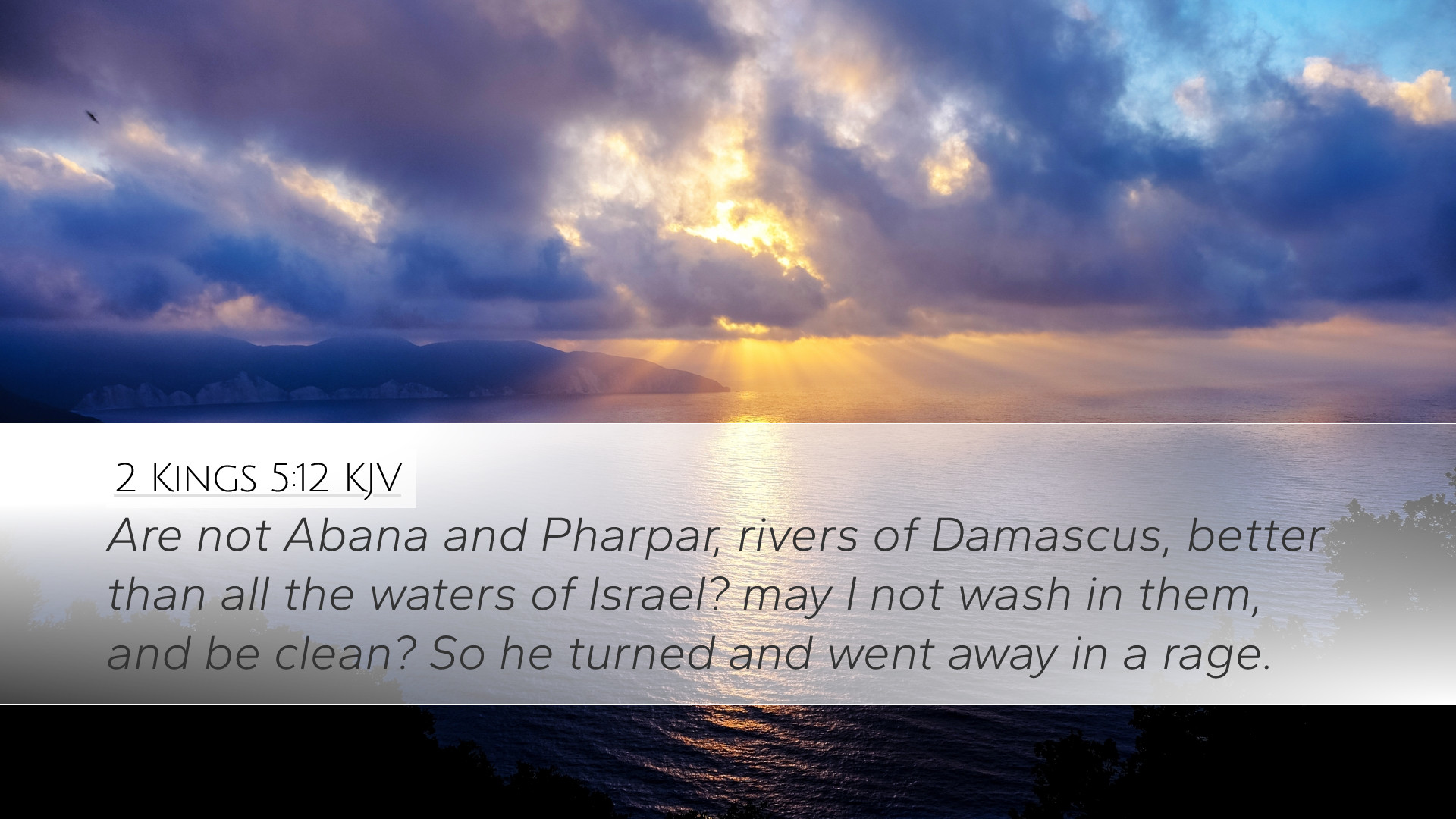Commentary on 2 Kings 5:12
Verse Text: "Are not Abana and Pharpar, rivers of Damascus, better than all the waters of Israel? may I not wash in them, and be clean? So he turned and went away in a rage." (2 Kings 5:12)
Contextual Overview
The story of Naaman, a Syrian military commander suffering from leprosy, offers profound insights into faith, humility, and divine healing. This passage encapsulates Naaman's struggle, showcasing the tension between his expectations and the simplicity of God’s instructions through the prophet Elisha.
Commentary Insights
Matthew Henry’s Commentary
Matthew Henry emphasizes Naaman's initial resistance to the prophetic instruction, reflecting human pride and the tendency to trust in visible forms of healing rather than spiritual obedience. Henry notes that Naaman's question about the rivers of Damascus symbolizes a common human inclination to judge God's methods by personal criteria, rather than by divine authority.
In his commentary, Henry highlights the mercy of God in reaching out to Naaman, despite his initial arrogance. He points out that Naaman's reliance on geographical superiority reveals a worldview limited by cultural prejudices. Through this narrative, Henry elucidates the lesson that true healing requires humility and obedience to God’s chosen means.
Albert Barnes’ Notes
Albert Barnes further develops the interpretative aspects of this verse, noting that Naaman's reaction captures the essence of disbelief when faced with God's straightforward command. He observes that Naaman expected a grand display of power, consistent with his status as a military leader. Barnes contrasts the simple act of washing in the Jordan with Naaman's expectations, underscoring the significance of faith over ritualistic grandeur.
Barnes suggests that Naaman’s rhetorical questioning about the rivers of Damascus indicates a deeper spiritual conflict. Instead of taking the path of humility, Naaman initially chose to dismiss the command of God through Elisha, highlighting a common barrier to faith: the tendency to evaluate God’s ways through human logic.
Adam Clarke’s Commentary
Adam Clarke examines the geographical and cultural significance of the rivers Naaman compared to the Jordan. He notes that both Abana and Pharpar were supposed to be superior in clarity and reputation, marking Naaman's reluctance as indicative of a misunderstanding of spiritual cleansing. Clarke elaborates on the theme of divine humility by reflecting on how God often chooses the weak and foolish things of the world to confound the wise.
Clarke also remarks on the wider implications of Naaman's pride, emphasizing that many people today make similar excuses rather than submitting to God’s will. His commentary serves as a reminder that spiritual transformation often invites a confrontation with personal expectations and societal norms.
Theological Implications
The narrative of Naaman transcends its historical setting, emerging as a rich discourse on faith and divine healing. Several themes emerge from this pivotal verse:
- Humility in Obedience: True obedience often requires us to set aside our preconceptions and trust in God’s wisdom.
- The Danger of Cultural Pride: Naaman’s desire for the rivers of Damascus speaks to the universal struggle against cultural superiority and pride. God's methods are not confined to human frameworks.
- Faith Versus Knowledge: Naaman's educated skepticism reflects a broader discussion on the relationship between faith and understanding. God often calls us to act in faith beyond our comprehension.
Practical Applications
For pastors, students, and theologians, the reflections from this passage address the nuances of human nature in responding to divine instruction. Some key applications include:
- Encouragement to Trust in God’s Word: In ministry, leaders often face congregational concerns that echo Naaman's skepticism. Faithful teaching should encourage trust in God’s prescribed methods.
- Openness to Humility: The narrative serves as a reminder to encounter God’s work with an open heart, laying aside human expectations.
- Empowerment through Prayer and Counseling: Ministries can learn from the agents of healing in this story—how background, status, and tradition do not limit God’s reach.
Conclusion
In conclusion, 2 Kings 5:12 provides a rich tapestry for exploration, drawing lessons from Naaman's initial pride to the call for deeper faith and obedience. Through the collective insights of Matthew Henry, Albert Barnes, and Adam Clarke, this verse challenges believers to reassess their understanding of obedience to God and the means He uses to bring healing and restoration. Ultimately, Naaman’s story serves as a multipronged exhortation for all believers to come humbly before the Lord, allowing His grace to transform and heal.


